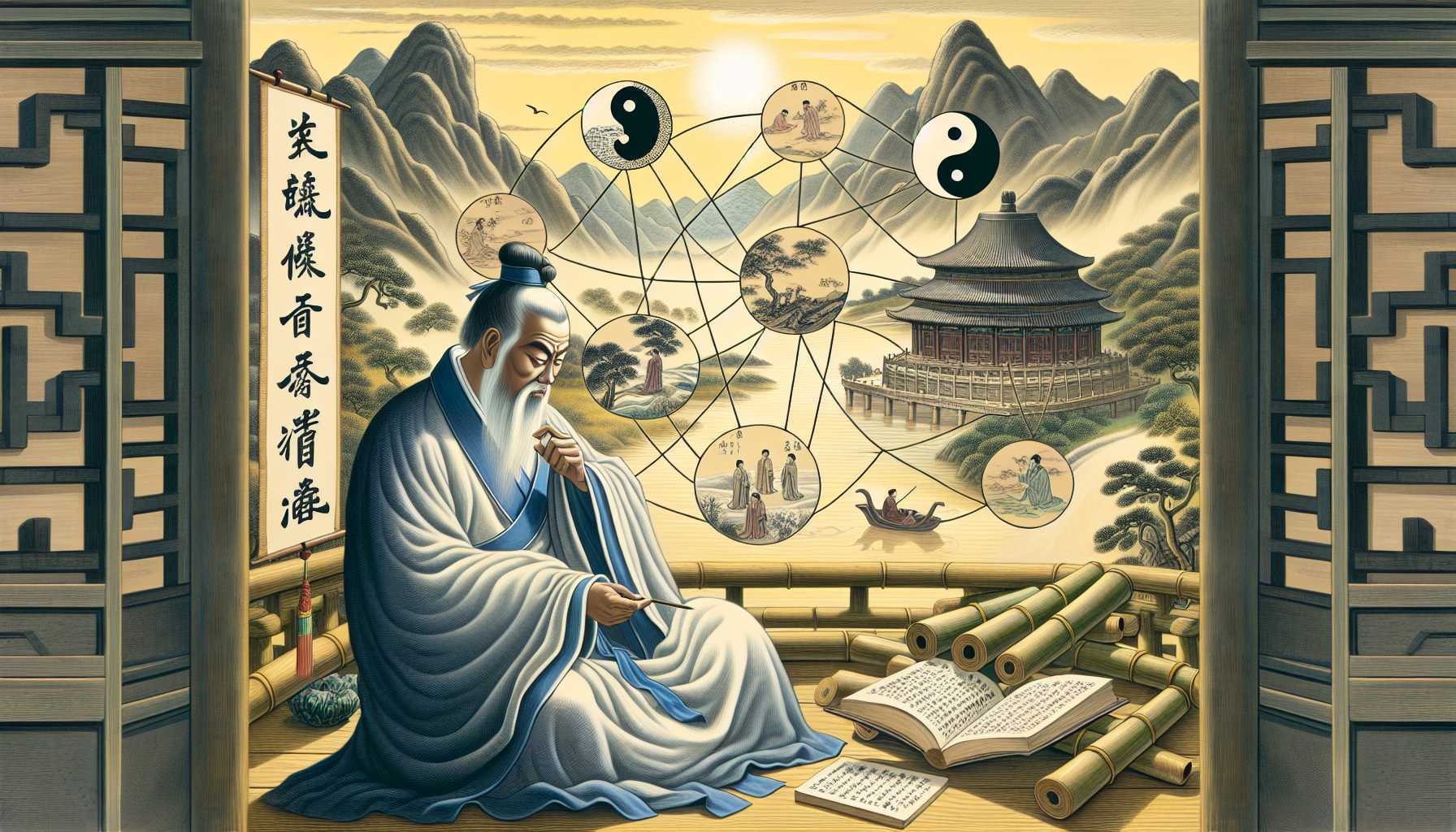
Confucius Life Teachings and Impact on Philosophy
The article on Confucius from the Internet Encyclopedia of Philosophy outlines the life, teachings, and impact of this influential Chinese philosopher.
Zhè piān guānyú Kǒngzǐ de wénzhāng láizì hùliánwǎng zhéxué bǎikē quánshū, gàishùle zhè wèi yǒu yǐngxiǎng lì de zhōngguó zhéxué jiā de shēngpíng, jiàoyì hé yǐngxiǎng.
这篇关于孔子的文章来自互联网哲学百科全书,概述了这位有影响力的中国哲学家的生平、教义和影响。
Born in 551 BCE in the state of Lu, Confucius developed a moral and philosophical system that emphasized ethics, politics, and social harmony.
Kǒngzǐ yú gōngyuán qián 551 nián chūshēng yú Lǔ guó, fāzhǎn chū yī zhǒng qiángdiào lúnlǐ, zhèngzhì hé shèhuì héxié de dàodé hé zhéxué tǐxì.
孔子于公元前551年出生于鲁国,发展出一种强调伦理、政治和社会和谐的道德和哲学体系。
Central to his teachings are the concepts of Ren (benevolence), Li (ritual and proper conduct), and the importance of filial piety.
Tā jiàoyì de héxīn shì rén (cí悲), lǐ (yíshì hé shìdàng xíngwéi) yǐjí xiàodào de zhòngyào xìng.
他教义的核心是仁(慈悲)、礼(仪式和适当行为)以及孝道的重要性。
He promoted the idea that moral integrity and virtuous leadership would cultivate a just society, advocating for education as a means of self-improvement and societal benefit.
Tā tíchàng dàodé chéngxìn hé déxíng lǐngdǎo nénggòu péiyǎng gōngzhèng shèhuì, bìng zhǔzhāng jiàoyù zuòwéi zìwǒ tíshēng hé shèhuì lìyì de shǒuduàn.
他提倡道德诚信和德行领导能够培养公正社会,并主张教育作为自我提升和社会利益的手段。
Confucius's ideas were documented by his followers in texts such as the 'Analects,' which became foundational to Chinese thought and culture.
Kǒngzǐ de sīxiǎng bèi tā de zhuīsuízhě jìlù zài rú 'Lùnyǔ' děng jīngdiǎn zhōng, zhèxiē jīngdiǎn chéngwéi zhōngguó sīxiǎng hé wénhuà de jīchǔ.
孔子的思想被他的追随者记录在如《论语》等经典中,这些经典成为中国思想和文化的基础。
Despite not gaining immediate prominence during his lifetime, Confucianism eventually rose to become a dominant ideology, influencing various aspects of Chinese governance, social structure, and personal behavior.
Jǐnguǎn zài tā shēngqián méiyǒu lìjí xiǎnxiàn chū míngwàng, rúxué zuìzhōng shàngshēng wèi zhǔdǎo yìshí xíngtài, yǐngxiǎng zhe zhōngguó de zhìlǐ, shèhuì jiégòu hé gèrén xíngwéi de gège fāngmiàn.
尽管在他生前没有立即显现出名望,儒学最终上升为主导意识形态,影响着中国的治理、社会结构和个人行为的各个方面。
The article also discusses the enduring legacy of Confucian thought, noting its relevance in contemporary discussions about ethics and governance, as well as its influence beyond China, impacting East Asian cultures and philosophies.
Zhè piān wénzhāng hái tǎolùnle rújiā sīxiǎng de chíjiǔ yíchǎn, zhǐchū qí zài dāngdài guānyú lúnlǐ hé zhìlǐ de tǎolùn zhōng de xiāngguān xìng, yǐjí tā zài zhōngguó yǐwài de yǐngxiǎng, yǐngxiǎng zhe dōngyà wénhuà hé zhéxué.
这篇文章还讨论了儒家思想的持久遗产,指出其在当代关于伦理和治理的讨论中的相关性,以及它在中国以外的影响,影响着东亚文化和哲学。
Overall, the article highlights how Confucius's teachings established a framework for moral conduct and social responsibility that shaped not only Chinese civilization but also broader philosophical inquiries into ethics and human relations throughout history.
Zǒng de lái shuō, wénzhāng qiángdiào le Kǒngzǐ de jiàoyì rúhé jiànlìle yī gè dàodé xíngwéi hé shèhuì zérèn de kuàngjià, zhè bù jǐn sùzhìle zhōngguó wénmíng, érqiě duì lìshǐ shàng de lúnlǐ hé rénjì guānxì chǎnshēngle gèng guǎngfàn de zhéxué tàntǎo.
总的来说,文章强调了孔子的教义如何建立了一个道德行为和社会责任的框架,这不仅塑造了中国文明,而且对历史上的伦理和人际关系产生了更广泛的哲学探讨。
Based on this article
